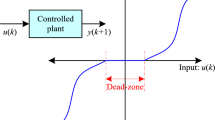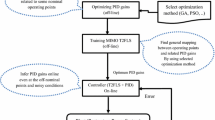Abstract
In this article, an adaptive controller, which can minimize both tracking error and control energy, is introduced by fuzzy rule emulated network (FREN) for a class of non-affine discrete time systems. The controlled plant can be assumed as fully unknown system dynamic. Only the estimated boundary of pseudo partial derivative (PPD) is required for an on-line learning phase. The update law is derived to guarantee the convergence of tuned parameters. Lyapunov techniques are utilized to demonstrate the performance of a closed-loop system regarding the integration of the infinite cost function. The computer simulation and electronic circuit system validate the effectiveness of the proposed control scheme.













Similar content being viewed by others
References
Hou ZS, Wang Z (2013) From model-based control to data-driven control: survey, classification and perspective. Inf Sci 235:3–35
Meng D, Jia Y, Du J, Yu F (2011) Data-driven control for relative degree systems via iterative learning. IEEE Trans Neural Netw 22(12):2213–2225
Coelho LDS, Marcelo WP, Rodrigo RS, Coelho AAR (2010) Model-free adaptive control design using evolutionary-neural compensator. Expert Syst Appl 37(1):499–508
Hahn B, Oldham KR (2012) A model-free ON-OFF iterative adaptive controller based on stochastic approximation. IEEE Trans Control Syst Technol 20(1):196–204
Hou ZS, Jin ST (2011) A novel data-driven control approach for a class of discrete-time nonlinear systems. IEEE Trans Control Syst Technol 19(6):1549–1558
Khan SG, Herrmann G, Lewis FL, Pipe T, Melhuish C (2012) Reinforcement learning and optimal adaptive control: an overview and implementation examples. Annu Rev Control 36:42–59
Cheng ST, Shih JS, Chang TY (2013) GA-based actuator control method for minimizing power consumption in cyber physical systems. Appl Intell 38:78–87
Wang L, Liu Z, Chen CL, Zhang Y (2013) Interval type-2 fuzzy weighted support vector machine learning for energy efficient biped walking. Appl Intell. doi:10.1007/s10489-013-0472-2
Li P, Xiao H (2013) An improved quantum-behaved particle swarm optimization algorithm. Appl Intell. doi:10.1007/s10489-013-0477-x
Al-Tamimi A, Lewis FL, Abu-Khalaf M (2008) Discrete-time nonlinear HJB solution using approximate dynamic programming: convergence proof. IEEE Trans Syst Man Cybern B 38(4):943–949
Liu D, Wei Q (2013) Finite-approximation-error-based optimal control approach for discrete-time nonlinear systems. IEEE Trans Cybern 43(2):779–789
Zhang H, Wei Q, Liu D (2011) An iterative adaptive dynamic programming method for solving a class of nonlinear zero-sum differential games. Automatica 47(1):207–214
Li H, Liu D (2012) Optimal control for discrete-time affine non-linear systems using general value iteration. IET Control Theory Appl 6(18):2725–2736
Dierks T, Jagannathan S (2012) Online optimal control of affine nonlinear discrete-time systems with unknown internal dynamics by using time-based policy update. IEEE Trans Neural Netw 23(7):1118–1129
Treesatayapun C, Uatrongjit S (2005) Adaptive controller with Fuzzy rules emulated structure and its applications’. Eng Appl Artif Intell 18:603–615. Elsevier
Treesatayapun C (2009) Nonlinear discrete-time controller based on fuzzy-rule emulated network and shuttering condition. Appl Intell 31:292–304
Treesatayapun C (2011) A discrete-time stable controller for an omni-directional mobile robot based on an approximated model. Control Eng Pract 19:194–230. Elsevier
Yang C, Ge SS, Xiang C, Chai T, Lee TH (2008) Output feedback NN control for two classes of discrete-time systems with unknown control directions in a unified approach. IEEE Trans Neural Netw 19(11):1873–1886
Liu YJ, Chen CLP, Wen GX, Tong S (2011) Adaptive neural output feedback tracking control for a class of uncertain discrete-time nonlinear systems. IEEE Trans Neural Netw 22(7):1162–1167
Chi R, Wang D, Hou Z, Jin S (2012) Data-driven optimal terminal iterative learning control. J Process Control 22:2026–2037
Author information
Authors and Affiliations
Corresponding author
Rights and permissions
About this article
Cite this article
Treesatayapun, C. Balancing control energy and tracking error for fuzzy rule emulated adaptive controller. Appl Intell 40, 639–648 (2014). https://doi.org/10.1007/s10489-013-0493-x
Published:
Issue Date:
DOI: https://doi.org/10.1007/s10489-013-0493-x




